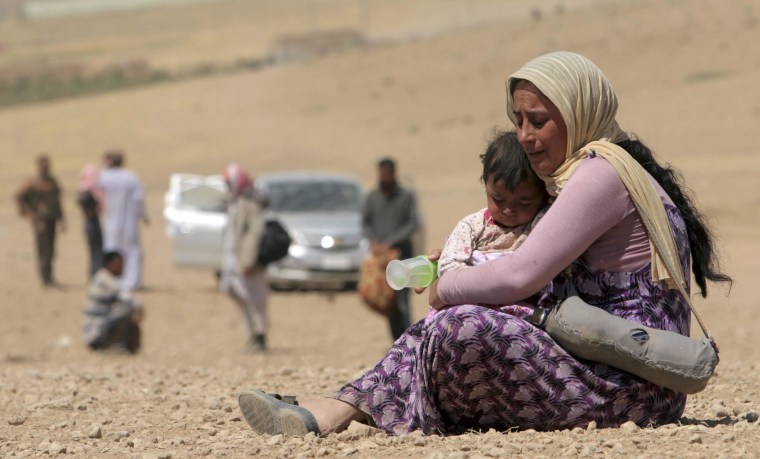As the crisis in Iraq evolves by the minute, here's the latest on where things stand in the crisis and what comes next.
Who does the U.S. support in Iraq now?
After throwing its support behind Iraq’s Prime Minister Nouri al-Maliki for years, the U.S. has broken away from the embattled leader it says failed to form an inclusive government, stoking unrest. Maliki is trying to cling to power and take a third term as prime minister. He has challenged the country’s new president — an ethnic Kurd named Fouad Masoum who said he is dedicated to forming "a broader-based government" — and the move did not go over well with the United States. The Obama administration on Monday simultaneously expressed full support for Massoum and warned the longtime leader, Maliki, not to meddle.
Why did the U.S. get involved in Iraq — again?
Sunni militants under the black banners of ISIS have been rampaging through Iraq for months, waging a bloody campaign to establish an Islamic State covering a broad swath of territory straddling the Iraq-Syria border.
While the militants’ rapid-fire advance has always been a concern to the West, the U.S. only became directly involved last week as fighters closed in on the strategic northern city of Erbil. Shortly after reports emerged of the rebels’ encroachment towards Erbil — and the hundreds of refugees trapped on a mountaintop there — President Barack Obama made the call to intervene.
Why does Erbil matter?
Iraqi refugees, fleeing the threat of religious persecution at the hands of ISIS, have fled to Erbil in droves. The city of 1.5 million has taken in more than 4,000 members of the ancient Yazidi sect alone.
But beyond acting as a refuge, Erbil also plays a major strategic role for any U.S. operation in Iraq. The U.S. maintains a consulate within the city, as well as 800 military personnel who arrived in Iraq earlier this year to help with security. The city also serves as the capital of Iraq's semi-autonomous Kurdish region. Throughout the U.S. involvement in the region, the Kurds have become a major ally and a stabilizing force among the divided ethno-religious factions in Iraq.
Who are the Kurds and how to they fit in?
Since the start of the ISIS campaign, Kurdish forces, known as the peshmerga, have been the most effective at battling the militants. While many members of Iraq’s own security forces fled in the face of an ISIS advance — ditching their weapons, uniforms and command posts as they ran — the Pershmerga helped regain control of key cities and have put up a strong fight. The relationship between the Kurds and Baghdad, however, has long been contentious.
Why do the Kurds need U.S. support?
Iraq's security forces have proven no match for ISIS, and Kurdish forces have been outgunned by heavily armed ISIS militants from the get-go. The militants are believed to possess heavy artillery, armored vehicles and even U.S.-made weapons. ISIS has amassed its arsenal in a variety of ways — some weapons bought with extortion-racket money, others seized or picked up when Iraqi forces fled their post, and others still picked up from years of fighting in Syria and moved across the porous border.
So what is the U.S. doing now?
The U.S. started a campaign of airstrikes and humanitarian-aid deliveries from the air on Friday. The airstrikes are targeting ISIS artillery and installations, plus providing support to Kurdish forces protecting Erbil. In addition to helping protect trapped Iraqi civilians, the airstrikes also could be used to protect U.S. personnel from ISIS convoys “should they approach Erbil,” according to Secretary of Defense Chuck Hagel.
Have we hit anything yet? Is it helping?
The military said its warplanes have hit a variety of targets, but declined to provide specifics on many. The military did say Monday that an airstrike a day earlier had destroyed an ISIS convoy moving to attack peshmerga defending Erbil.
What else is the U.S. doing to help?
In addition to backing up the peshmerga with airstrikes, the U.S. is also directly arming the fighters. U.S. officials told NBC News that the CIA is shipping weapons to the Kurds instead of routing arms through Baghdad, as was previously done. The Kurds have been asking for the weapons for some time.
Are there any other players in the game?
The U.S. isn’t the only country with an interest in the breakneck-pace of developments on the ground. Australia, France and Britain have offered assistance to provide aid to trapped refugees in the northern Sinjar mountains — but stopped short of military action.
Most of the 40,000 refugees stranded on the mountain are Christians and members of a small religious sect, the Yazidi, that is closely allied with the Kurds. ISIS has threatened them with execution if they do not convert to Islam.
Iran, too, has a vested interest in defeating the Sunni militants. As the regional axis for Shiite Islam, Iran has long backed Shiite candidates in Iraq and, at the outset of ISIS’ explosion onto the scene, offered to send forces to protect Shiite shrines. It is unclear what role — if any — Iran is currently playing, behind the scenes.
So what happens now?
As the political crisis plays out in Baghdad, the U.S. is continuing to carry out airstrikes and aid Kurdish fighters battling ISIS in the north.
Obama has dismissed the idea of sending U.S. ground troops into Iraq, but warned that American involvement against ISIS will “be a long-term project” as the problem won’t be solved “in weeks.”
— NBC's Erin McClam, Jim Miklaszewski and Courtney Kube contributed to this report.
